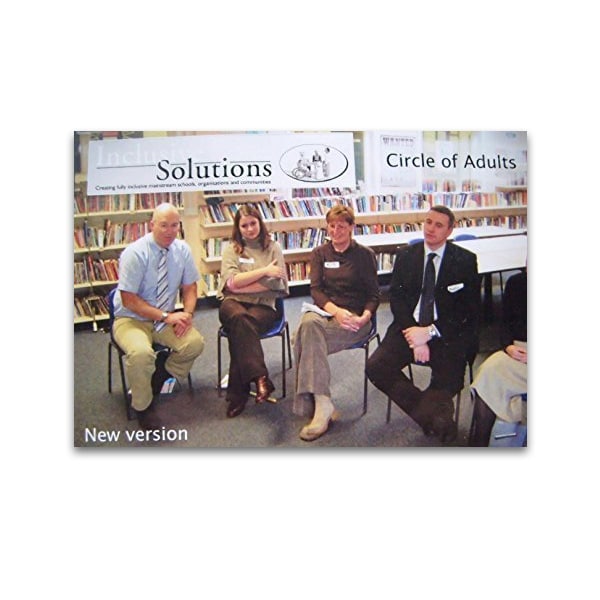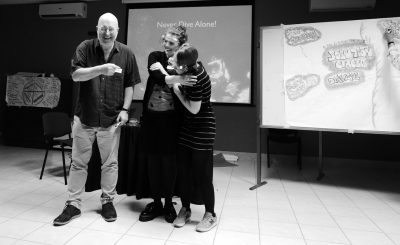Problem Solving
When in doubt – build a team – make sure they have good problem solving processes to use!
Circles of Adults – A unique group problem solving process created by Colin Newton and Derek Wilson of Inclusive Solutions

Circle of Adults

The Online Course
A selection of online courses is now available via the Teachable platform.
Learn about Problem solving in depth – the Circle of Adults process at your own pace.
Sign Up Now
The Book
Circles of Adults is an excellent approach to problem solving which we are able to use with your team on request. We can use it for real around the inclusion of challenging young people or other real issues of inclusion or we can model the approach plus offer training and coaching in carrying the processes out.
‘wonderful process – every IEP and TAC Meeting should involve this instead of the meaningless targets and endless discussion’
Get The Book
Demonstration video
Downloadable video of a Circle of Adults taking place from start to finish! Real-time multi-agency problem-solving in action!
Purchase a video of this processClick here to read more about the process
Click here for the training description
Why not enlist us to take your team through 10 monthly sessions will model this in-depth problem solving process for use by teams working around the inclusion of a challenging individual. Using both process and graphic facilitation the group is guided through a set of key questions to reach a shared and deeper understanding of the young person’s challenging behaviours, unmet emotional needs and to develop fresh strategies to support change. Participants will be expected to develop facilitation skills as well as to bring the stories of the most challenging young people they are involved with to the group sessions as the problem presenter in the Circles of Adults process.

Participants will receive direct feedback and supportive coaching as they learn the process skills involved. By the end of the 10 sessions participants will feel able to lead the process within their own work settings.
Circle of Adults
Circle of Adults is an in-depth process that supports professional teams to problem solve together around a young person presenting with complex social, emotional and behavioural needs. This reflective problem solving process differs from other person centred planning processes in that the child and family are not present. This process is for stuck teams trying to figure out issues where they need to be very honest with each other, share their emotions, state their greatest fears and struggles in a safe situation. Whilst it is good practice to let a family know that they are being talked about in a meeting – they need to know that this is the professionals sorting themselves out for their benefit and not a time for them to participate. If they insist on being present then talk to us about our emerging Family Circles work.
This innovative process enables adults involved in working with the young person to reflect and hypothesise about this young person’s needs. This leads to joint problem-solving around ways forward to support this young person in their educational setting. The process takes around 90 minutes.
Circle of Adults uses a structured process and graphic facilitation to guide staff through a set of key questions to reach a deeper understanding of a young person’s behaviour and needs. This deeper understanding is used to generate new strategies for the team’s work with the young person.
Examples of feedback from staff who have attended the sessions include:
The session was very helpful in planning ways forward and empowered for staff
Headteacher of a Devon primary school
It is the first time that we have shared how this behaviour impacts on us and it’s good to know how we can support each other
Devon primary school teacher
Brilliant! Getting staff to agree and adhere to common strategies is the key to success
Teacher in specialist provision in Torbay
OFSTED name Circle of Adults process as an example of outstanding Practice: Formation of a Circle of Adults to prevent exclusion of a primary age child.
Examples from a longer term study looking at the impact of Circle of Adults on staff include:
- a 70% reduction in their level of concern
- a 65% increase in their confidence in managing pupils’ behaviour
- a 70% increase in knowledge of working with pupils with Social, Emotional and Behavioural difficulties
You don’t often get staff meetings like this! The outreach support team invited adults who had contact with the child causing concern to a twilight session and the whole school staff were there. The headteacher of the Dacorum centre led a brainstorming session where the adult circle raised issues and concerns and later, hypothesis, reasons and solutions, in a semi formal setting. Only one person talked at a time and one person took on the role of the ‘voice of the child’ – his representative. Comments, concerns and suggestions came swiftly. They felt angry, the pupil was aggressive and there were complaints from parents. The head of outreach created a large and colour coded ‘graphic’ wall display of the issues as the session went on under headings of ‘Hot Issues’ ‘Relationships’ ‘System Issues’ ‘Hypotheses’ and ‘Strategies’. Amongst the comments made – under ‘hypotheses’-staff wondered if the pupil felt overwhelmed or left out or found it difficult to adjust to changes. The remarks made by the voice of the child included “people say different things” and “people say I am aggressive, but I don’t always mean to be”. The result, a very clear insight by all into the pupil’s needs and following from this, practical plans and programmes of work specifically for this child created by the circle and therefore fitting perfectly into the work of the school. For example, finding a male role model, and a Year 6 buddy, also meeting and greeting each morning. Their solutions, copied and sent to the school later for reference, to make a positive difference – a happy child, learning effectively and no longer in danger of exclusion.
Quick step by step guide to Circles of Adults

Further research validation for our very own Circle of Adults process can be seen in EPIP Vol 36 2020 “Examining the Circle of Adults process for Children Looked After: the role of self-efficacy and empathy in staff behaviour change“. Staff reported greater self efficacy, success implementing actions, enhanced group cohesion, task focus, insights, empathy and much more besides!
This next clip is an extract from the book, Circle of Adults, read by Colin Newton.
Insight and Solution Circles

Our most recent problem solving process – ‘Insights and Solutions Circle‘ a new expanded version of Solution Circle that uses some of the best of the Circle of Adults process. Its a 50 minute process and works really well with families and professionals! Contact us today for a live demo or training…
Steps
- Problem presented
- Questions asked
- Theories Shared
- Strategies listed
- Dialogue re selected strategies
- Next steps
- Appoint coach
- Final reflections

4 Questions
Jack Pearpoint and Marsha Forest designed The Four Questions exercise to help families, groups and organisations to get out of the trap of negative thinking. For example, an organisation kept asking the people they work with to tell them what was wrong, so they could improve. But the people told them everything was really OK. They knew some things weren’t right. Jack and Marsha suggested they ask a new set of questions.
- What are we doing well right now?
- What could we be doing better?
- What could we be doing differently?
- What can we do now (within 48 hours) to start doing things better and/or differently?
Problem Solving Tools and Techniques – is a popular training course we provide. Its is fun and interactive but the tools and techniques are powerful and practical and well ‘out of the box’! In this clip some practitioners show off their ‘thinking hats’ and just about manage to get their final reflections out – before laughter takes over!
Solution Circles

A Solution Circle is a 30 minute creative Problem Solving Process for getting unstuck…Ideal for busy people! lt was designed by Marsha Forest & Jack Pearpoint. This is a short and powerful tool. It is effective in getting “unstuck” from a problem in life or work. Solution Circles are tools of “community capacity”. It assumes and demonstrates that nearby people – in any community or work place have the capacity to help – if asked. It requires a person to ASK – not an easy thing in our culture of privacy and “do it alone”. This tool puts all the values we espouse into practice and demonstrates that TOGETHER WE’RE BETTER.
Restorative Solutions
Restorative Justice as a process is a great approach to ‘making it right’ instead of simply punishing offenders. Find out more about it from some of the successful work carried out in Nottingham
Do something. In the face of hatred, apathy will be interpreted as acceptance — by the haters, the public and, worse, the victim. Decency must be exercised, too. If it isn’t, hate invariably persists.
Restorative Justice
Restorative Justice is an essential ingredient for the inclusive school and education system. Howard Zehr is one of the pioneers of this Restorative process. See him on video on YouTube so is Desmond Tutu who can be seen on video here.
We have been supporting the development of Robin Tinker’s work in Nottingham focused on secondary schools. Check out the links on this national UK site. Transforming Conflict is an excellent site developing restorative justice still further. There are at least 6 national UK projects currently being evaluated and highly likely to be followed by a national roll out of this initiative.
Restorative Interventions Training: North East England
‘I have just done a rough count of children who have been involved in Restorative Conferences since we completed our training with you and I am up to about 100 children.
We have also had about 12 parents involved in conferences. We are using the language so much it is second nature and there have been many more children who have benefited from this I’m sure! We are really pleased with how it is going and just this week me and Jane Cunningham (Head Teacher) have held a couple of really successful conferences where the children have been so on board and positive at the end of the process it has confirmed to us that we are doing the right thing!
We have had times when we doubt what we are doing because we are still struggling to get some staff on board but luckily we have been able to remind each other of our successes! We both agree that your training was very inspiring and would like to thank you for that! We will keep chipping away at everyone!’
Thanks again
Alison Holmes Relationship Manager, Seaview Primary
Restorative Solutions: Making it Work
Colin Newton and Helen Mahaffey

This is a practical book about how to implement Restorative interventions and approaches in schools. The book gives guiding ideas, principle, theory and values as well as direct scripts for those involved in direct contact with pupils, staff and parents. Restorative Solutions are about inclusion, transforming relationships and radical ways of impacting upon conflict and rule breaking behaviour. All schools in the UK and Support Service staff will want a copy. Parents will also find it an extremely valuable resource for bringing up their own children peacefully.
There is also a pack available featuring a great DVD created in Milton Keynes led by Tom McCready.
Our Training
Educational Psychologists and person centred planning
Problem solving tools and techniques
Live visioning and problem-solving
Would you like some training in Problem Solving?
Would you like any of these processes modelled for you?
Call us or email on numbers below:


